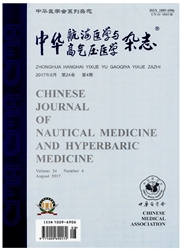

 中文摘要:
中文摘要:
目的 比较海军舰艇与岸勤官兵睡眠质量和日间思睡程度.方法 应用匹兹堡睡眠质量指数(Pittsburgh sleep quality index,PSQI)和爱泼沃斯嗜睡量表(Epworth sleepiness scale,ESS)对海军某部舰船和岸勤官兵各50名的睡眠质量及日间思睡程度进行评估.结果 舰船组官兵睡眠质量问题发生率为57.14%,与岸勤组官兵(29.17%)比较差异有统计学意义(P<0.05).2组官兵在睡眠质量、入睡时间、睡眠时间、睡眠效率、睡眠障碍、日间功能等6个成分上差异均有统计学意义(P<0.05).舰船组官兵日间过度思睡发生率为61.22%,与岸勤组官兵(27.08%)比较差异有统计学意义(P<0.05).结论 舰艇官兵睡眠质量较岸勤官兵差,同时日间思睡程度较岸勤官兵高.
 英文摘要:
英文摘要:
Objective To investigate the sleep quality and daytime sleepiness between naval afloat and ashore personnel.Methods Sleep quality and daytime sleepiness of 50 naval afloat personnel and 50 naval ashore personnel were evaluated by using the Pittsburgh Sleep Quality Index (PSQI) and the Epworth Sleepiness Scale (ESS).Results The incidence of sleeping disorder among the afloat or shipboard naval personnel accounted for 57.14%, which showed statistical significance as compared with 29.17% of the ashore personnel (P 〈 0.05).Statistical significance could be seen in sleep quality, sleep latency, sleep time, sleep efficiency, sleep disorder as well as daytime dysfunction, when comparisons were made between the 2 groups (P〈0.05).The incidence of daytime sleepiness in the naval afloat personnel was 61.22%, which was of statistical significance, as compared with 27.08% of the ashore personnel (P 〈 0.05).Conclusions The sleep quality of the afloat naval personnel was poorer than that of the ashore personnel, while daytime sleepiness was severer.
 同期刊论文项目
同期刊论文项目
 同项目期刊论文
同项目期刊论文
 Xylaria nigripes mitigates spatial memory impairment induced by rapid eye movement sleep deprivation
Xylaria nigripes mitigates spatial memory impairment induced by rapid eye movement sleep deprivation Symptoms and occurrences of narcolepsy: a retrospective study of 162 patients during a 10-year perio
Symptoms and occurrences of narcolepsy: a retrospective study of 162 patients during a 10-year perio The effect of IGF-1 on symptoms of sleep deprivation in a rat model of inflammatory heart disease an
The effect of IGF-1 on symptoms of sleep deprivation in a rat model of inflammatory heart disease an Effect of erythropoietin (EPO) on plasticity of nervous synapse in CA1 region of hippocampal of vasc
Effect of erythropoietin (EPO) on plasticity of nervous synapse in CA1 region of hippocampal of vasc Risk Factors Associated with Sleep Disturbance following Traumatic Brain Injury: Clinical Findings a
Risk Factors Associated with Sleep Disturbance following Traumatic Brain Injury: Clinical Findings a Correlation between Endothelial Dysfunction, Rho-associated Protein Kinase Activity, C-reactive Prot
Correlation between Endothelial Dysfunction, Rho-associated Protein Kinase Activity, C-reactive Prot Modafinil treatment prevents REM sleep deprivation-induced brain function impairment by increasing M
Modafinil treatment prevents REM sleep deprivation-induced brain function impairment by increasing M 期刊信息
期刊信息
